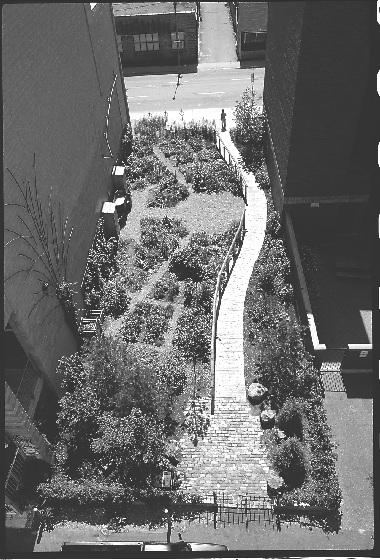Alex Wilson Community Garden

The Earth Council Institute of Canada is pleased to announce the publication of an article on Toronto's Alex Wilson Community Garden in the Local Environment journal.
The garden was opened in June 1998 at 552 Richmond Street West in
Toronto.
For more information, please contact the Earth Council Institute of Canada
at (416) 498-3150
or e-mail
ecpeters@web.net
The garden is named in memory of Alex Wilson, a landscape designer, community activist and writer who worked and lived in Toronto until his death in 1993. During his life, Wilson was an active community gardener, and author of the book The Culture of Nature (1991). Wilson was an advocate of using indigenous plant species to restore natural biodiversity, and to reconnect urban dwellers with the natural history of the land that sustains them.
The garden was designed by Katherine Dugmore, Kent Ford, and John Holmes; their winning design was selected from over 60 submissions to a competition sponsored by the Alex Wilson Community Project and the Design Exchange in Toronto. The design of the garden recalls the historical relationship between the people and the land of southern Ontario, and is demonstrated through three symbolic landscapes: lakeshore, farmland, and wilderness. The naturalized areas of the garden have been planted exclusively with native plant species, and are expected to have a positive impact on local biodiversity. The Earth Council Institute of Canada has assisted the Alex Wilson Community Garden Committee in developing both ecological and socio-economic frameworks for monitoring the positive impacts of the garden.
Abstract - Community gardens and sustainable land use planning: a case study of the Alex Wilson Community Garden.
Kim Peters, Lorraine Johnson and Seana Irvine, 1999.
Local Environment, Vol. 4, No. 1, pp.35-48.
Contact:
Kim Peters
An analytical account of the history and aspirations of the Alex Wilson Community Garden in Toronto provides an ideal opportunity to examine the connections between two typically distinct enterprises: ecological restoration and community gardening. These are both important contemporary ecological movements, but are rarely combined in a single project that demonstrates the principles of sustainable land use and community planning.
The garden is named in memory of Alex Wilson, a landscape designer, community activist and writer who worked and lived in Toronto, Canada. During his life, Wilson established a community garden which was eventually replaced by conventional urban development. After his death in 1993, friends and colleagues decided to honour his memory by establishing a permanent community garden in his name. The "Alex Wilson Community Garden" is currently under construction in downtown Toronto, and will open to the public in the spring of 1998.
The case study will explore how the garden reflects Wilson's work by linking community gardening and ecological restoration. These features are unified in Wilson's work as a means of nurturing relationships between people, communities, and the landscape - relationships that are social, economic, and ecological. In his book, The Culture of Nature (1991), Wilson argues that "we must build landscapes that heal and empower, that make intelligible our relations with each other and the natural world."
The Alex Wilson Community Garden illustrates in a practical manner the principles espoused by Wilson through its design, planning and functioning. The case study will report on the innovative approach to landscape design taken in the garden, which reconstructs the natural and cultural history of Southern Ontario, featuring lakeshore, agricultural, and woodland sections. The garden has been planted exclusively with native plant species, and is expected to have a positive impact on local biodiversity.
The planning process which led up to the design of the garden was participatory in nature, encompassing friends and colleagues of Alex Wilson, local residents and city planning officials, and made use of a number of planning tools not usually applied in an urban setting, including the granting of a conservation easement. The garden also addresses emerging issues associated with globalization and large cities by providing food production opportunities for local residents, including a low-income housing complex, and a near-by drop-in centre. Ecological monitoring and assessment of the naturalized area will be carried out by local residents.

![[new]](new01.gif)
